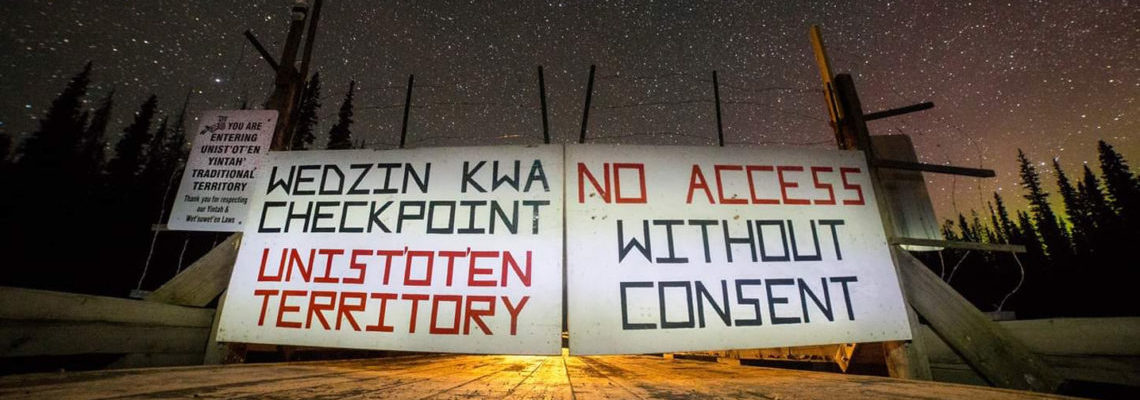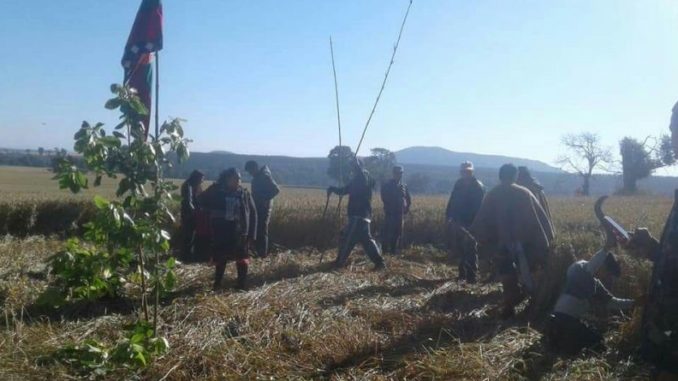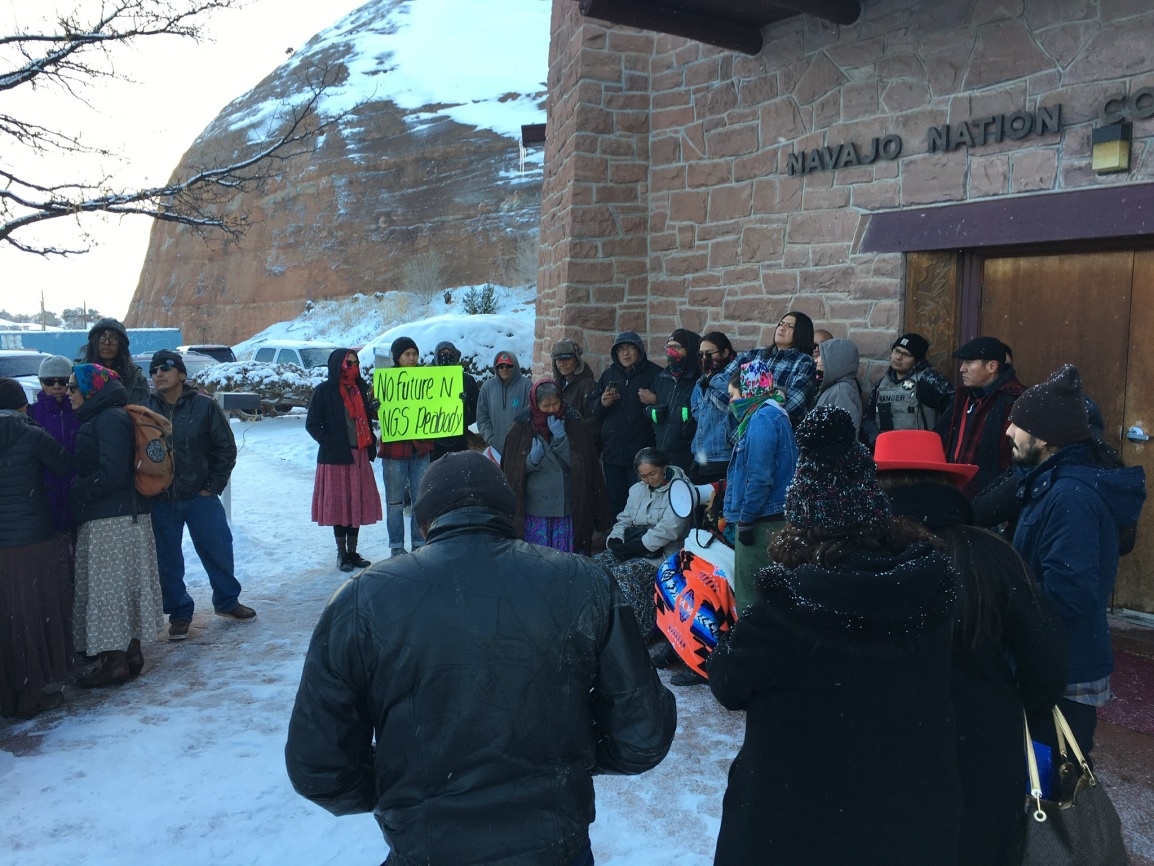Newsletter 5: ¡Ya Basta! Enough is Enough


January 7, 2019
Dear friends,
Greetings from The Red Nation. At the end of the newsletter, we will be featuring links to what we are reading in our study groups. Also, check out the Better Off Red podcast interview by Ragina Johnson and Brian Ward with Melanie Yazzie and Nick Estes about the politics and history of The Red Nation. (Subscribe to our newsletters here.)
Twenty-five years ago on New Year’s day, an Indigenous army emerged from the Lacandon Jungle declaring war on neoliberalism. When history was supposed to have ended with the fall of the Berlin Wall, the Zapatista Army of National Liberation (EZLN in Spanish) boldly proclaimed, “We are the product of 500 years of struggle.” The struggle for freedom did not die, it was gathering strength for the oncoming storm and the next 500 years. On January 1, 1994, the EZLN seized cities and towns in the Chiapas, Mexico’s poorest and southern most region. It was also on that day the North American Free Trade Agreement (NAFTA) went into effect, attempting to recolonize Mexico by privatizing land and exploiting cheap labor.
To this, the EZLN said in their first communiqué, “¡Ya Basta! Enough is Enough.”
Today, we shout ¡Ya Basta! because the tyrants have not been vanquished. In fact, they are on the rise. But so too is a new world in which many worlds fit.

Many Indigenous peoples welcomed Mexico’s newly elected left president, Andres Manuel López Obrador (or AMLO), but the Zapatistas warned him against stealing and plundering Indigenous lands. AMLO declared neoliberalism a “disaster” and called for a Fourth Transformation of Mexico that will chart a new course. Among his proposed measures are the planting of a millions of trees, ending corruption, the opening of a 100 new universities, and a nationwide ban on fracking. These are lofty aspirations. AMLO will have to reckon with NAFTA and the belligerence of its white supremacist neighbor to the North that wants to build a border wall.
Once described as an army, the Zapatistas are now a movement. While not taking up arms, the Zapatistas plan to protest the new government’s creation of a national guard which will recruit 50,000 youth; the expansion of economic zones; and the construction of the “Maya Train” which will service tourists and cuts through autonomous zones held by the Zapatistas and their supporters. The Zapatistas call them “death projects.”
They say ¡Ya Basta!

Indigenous peoples are the frontlines. Everywhere we are, we are in the way of profit and looting.
Last week, the Royal Canadian Mounted Police (RCMP) threatened violence against the Wet’suwet’en defending their homelands. An oil pipeline threatens to trespass through their territory. Unlike other Indigenous nations, the Wet’suwet’en have never signed a treaty with the Canadian government. In spite of having no legal authority over the land, the settler courts issued an injunction against the Unist’ot’en camp, which is blocking the trespass of a TransCanada pipeline. Canada and the energy company have labeled the camp a “rogue” group.
Steadfast in their resolve, the Wet’suwet’en are not alone. Before settler authorities could hand-deliver the court ordered eviction notice, their neighbors and relatives in Gidumt’en Territory erected a checkpoint halting their access and by protecting Wet’suwet’en sovereignty.
Because the original people stand in the way of profit, they face eviction. Such is the history of settler colonialism. This is during Canada’s “Truth and Reconciliation” process with Indigenous nations. How can there be reconciliation with a nation still stealing your land?
“The RCMP’s ultimatum, to allow TransCanada access to unceded Wet’suwet’en territory or face police invasion,” a Gidumt’en Access Point press release read, “is an act of war.”
They are now calling for a day of international solidarity on Tuesday, January 8. You can find more information on how you can support at the Unist’ot’en camp website.

In southern Chile, the Mapuche are reclaiming their stolen lands from the country’s elite. The meek shall inherit the earth.
“We have entered the Rankilko estate in the Mulchén municipality of the VIII region of Bio Bio,” stated a communiqué issued last week from the Mapuche community of Lof Likankurra. “This estate is in the hands of large landowners who took the land from us using violence against our people. This indefinite mobilization seeks to retake our land and territory—a fundamental right for the future of our Mapuche people.”
We thank our friends at Voices in Movement for providing English-Spanish translations of important reports and communiqués from Indigenous movements. Find and support their incredible work here.

Last week, the Navajo Nation considered buying out Navajo Generating Station. With a declining coal economy, Diné Water Protectors pointed out the stupidity of the idea—notwithstanding the havoc the coal industry has wreaked on Navajo Nation lands, waters, and people. If bought, the Navajo Nation will be saddled with all the risks and debt from the outdated and dirty power plant. While coal mining has been a steady revenue stream for many Diné families, it has also wreaked havoc on the land, water, and air. And outside interests—large corporations—have largely reaped all the profit, leaving the Navajo Nation to cleanup after its mess.
The Red Nation joined our relatives from Diné CARE, Black Mesa Water Coalition, Tó Nizhoni Ani, and members of the K’é Infoshop to protest the potential buy. You can read our special report on the future of the Navajo coal industry here. In demanding a new economy and a new system no premised on the destruction of the earth, one protester put it this way:
“I know the good way to do it. I know how Martin Luther King did it, I know how Malcolm X did it. That’s the good way. The good way is not to sit and down and be quiet and go outside.”

Lastly, we applaud the recognition of Indigenous women’s leadership in the US House of Representatives, with the elections of Deb Haaland and Sharice Davids, who took office last week. They both became the first American Indian women elected to Congress. We see this as a repudiation of Trump’s white supremacist agenda and the assault on Indigenous lands and sovereignty. But we also recognize that Haaland, like Alexandria Ocasio-Cortez, were present at Standing Rock as Water Protectors. While they both represent a corporate party, the Democrats, we ask them to remain accountable to movements and to remember that our people, the Land Defenders and the Water Protectors, have not stopped. After all, it was Indigenous movements that made their campaigns successful, not Wall Street.
We will not wait for elected officials to save us, only we have the power to do that. We are tired of false promises, and we cannot wait for false solutions.
In the spirit of Emiliano Zapata!
¡Ya Basta!
Solidarity forever,
Nick
PS: Keep your fists up and books open!
What we are reading:
Undoing Border Imperialism by Harsha Walia

Harsha is a friend and comrade of The Red Nation and is an organizer with No One Is Illegal. You can find a talk on her book here.
From the back:
Undoing Border Imperialism combines academic discourse, lived experiences of displacement, and movement-based practices into an exciting new book. By reformulating immigrant rights movements within a transnational analysis of capitalism, labor exploitation, settler colonialism, state building, and racialized empire, it provides the alternative conceptual frameworks of border imperialism and decolonization. Drawing on the author’s experiences in No One Is Illegal, this work offers relevant insights for all social movement organizers on effective strategies to overcome the barriers and borders within movements in order to cultivate fierce, loving, and sustainable communities of resistance striving toward liberation. The author grounds the book in collective vision, with short contributions from over twenty organizers and writers from across North America.




